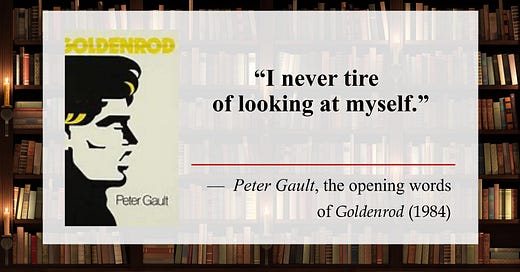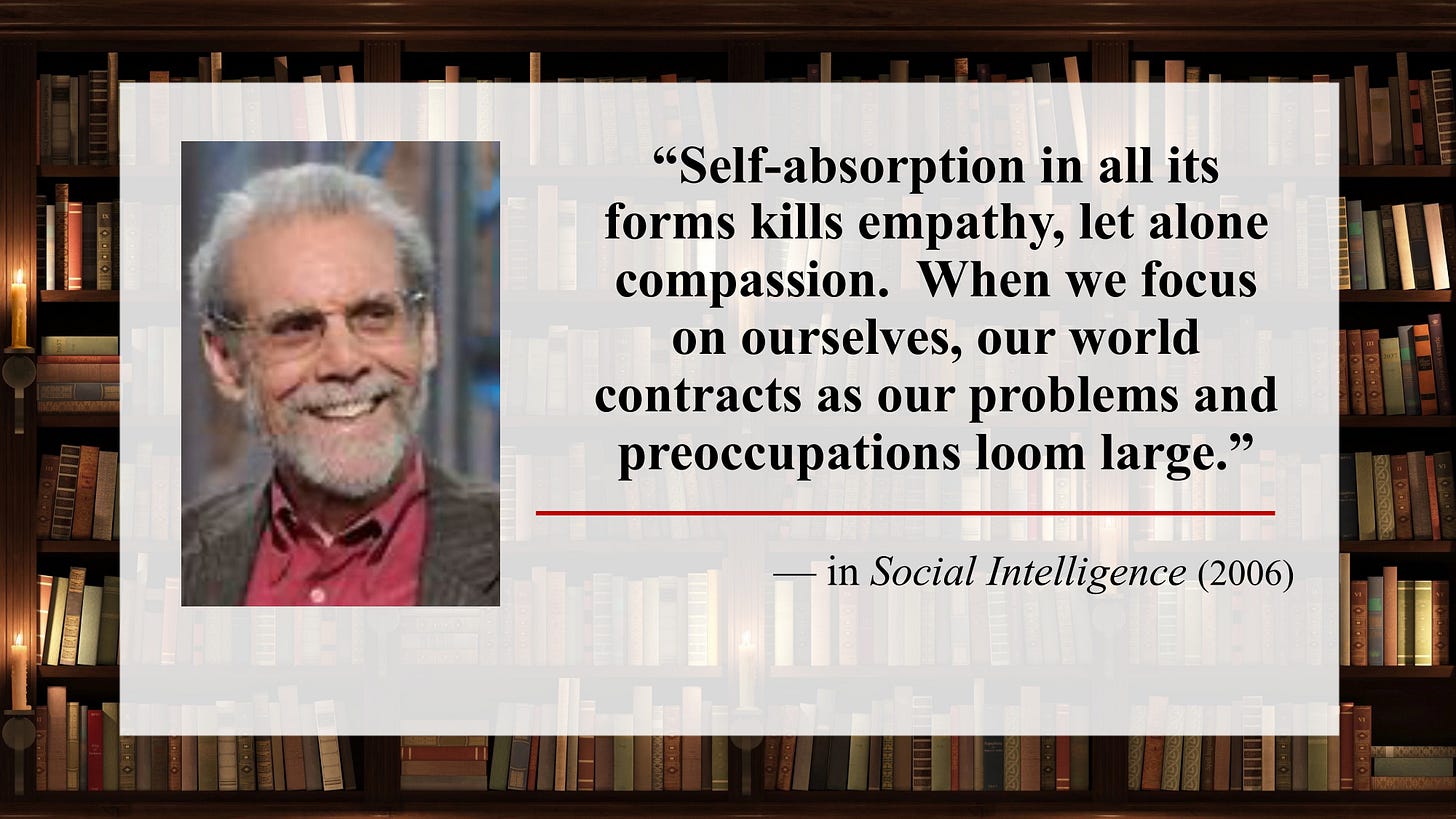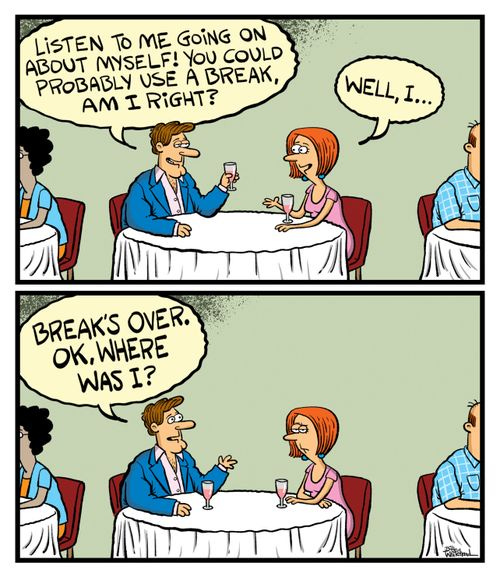Dr. Mardy's Quotes of the Week ("Absorption & Self-Absorption")
March 9-15, 2025 | THIS WEEK'S THEME: “Absorption & Self-Absorption"
Opening Line of the Week
When I first read this dramatic first sentence, I thought, “Sounds like something Narcissus would say.” And sure enough, as I read on, it quickly became apparent that Gault crafted the opener with the self-loving mythological figure in mind. In the opening paragraph, he had his narrator continue:
“I can stare for hours, without a minute of boredom. I take off my clothes and stand naked in front of one of those full-length mirrors and simply contemplate my body. It’s a narcissistic ritual—I don’t deny that—but it is more than mere narcissism. It’s like a religious ceremony. It expands my consciousness. It’s a form of transcendentalism.”
Right out of the gate, readers become aware of the self-absorption of protagonist Ken Harrison, an 18-year-old high school senior who appears to have it all. He’s smart, handsome, and, as the only male child in a household with seven sisters, he has a mother who dotes on him. Not surprisingly, he is also the star of the hockey team and—of course—has a beautiful girlfriend. As he struts around the opening pages like a peacock, though, we can’t help but think that his future may not be as idyllic as his past.
For more than 2,000 memorable opening lines from every genre of world literature, go to www.GreatOpeningLines.com.
This Week’s Puzzler
On March 7, 1946, this man was born in Stockton, California (he celebrated his 79th birthday two days ago). Raised in an intellectually-oriented household (his mother taught at the University of the Pacific and his father at Stockton College), he planned early in his life to follow in their footsteps.
After graduating magna cum laude from Amherst College in 1968, he did his graduate work at Harvard University, where he became fascinated by the meditation practices of various Eastern religions. This interest became the focus of his doctoral dissertation and resulted in his first book, The Varieties of the Meditative Experience (1977).
In 1984, he abandoned his lifelong dream of becoming a college professor by accepting a job as a reporter with The New York Times. Over the next twelve years, he became a respected science journalist, mainly posting stories on psychology-related topics. In 1995, while working for the Times, he came out with Emotional Intelligence: Why It Can Matter More Than IQ.
The book was not merely a surprise hit, it was a blockbuster, on The New York Times best seller list for eighteen months. The Harvard Business Review called the entire concept of Emotional Intelligence “a revolutionary, paradigm-shattering idea,” and our Mystery Man’s book on the subject has been described as one of the most influential books of the century.
Over the years, he has continued to produce popular books that have also been well received by his colleagues, including Primal Leadership (2001), Social Intelligence (2006), A Force for Good (2015), and The Emotionally Intelligent Leader (2019). In Social Intelligence, he wrote:
Who is this man? (Answer below)
How Have Absorption & Self-Absorption Shown Up in Your Life?
The American Heritage Dictionary (AHD) defines self-absorption as being “excessively self-involved.” The protagonist of Peter Gault’s 1984 novel Goldenrod—described in the Opening Line feature above—is a perfect example. He can stand in front of a mirror for hours, never growing weary of contemplating the features of the person he loves the most.
Self-absorption is one of a number of terms that refer to a preoccupation with one’s self—including egocentric, egoistic, and narcissistic. I especially enjoy the metaphorical richness of the term self-absorption, though, for it stimulates so many interesting visual images.
The noun absorption comes from the verb absorb, which literally means “to take in,” as a sponge does when it sucks up nearby liquids. The word derives from the Latin absorbēre, meaning “to take away by drinking or swallowing.” In the 16th century, the word absorption was figuratively extended to people taking things in mentally or emotionally—and by the mid-1700s, the word had fully taken on the modern sense of having one’s attention fully captured.
For over three centuries, the idea of being absorbed has carried a highly positive connotation. Indeed, in his seminal 1990 work, Flow: The Psychology of Optimal Experience, psychologist Mihaly Csikszentmihalyi first advanced the notion that people are happiest when they’re in a state of complete absorption. In his book, he called that state flow, and described it this way:
“A state in which people are so involved in an activity that nothing else seems to matter; the experience is so enjoyable that people will continue to do it even at great cost, for the sheer sake of doing it.”
Years later, he expanded on the idea by writing:
When people are completely absorbed in some activity—writing, cooking, fly fishing, gardening, painting, crocheting, or a gazillion other things—there is little awareness of time passing by, and no loss of interest or energy after many hours of exertion. And further, during absorption, any actual labor—physical or mental—that is involved doesn’t feel like work, but play. I don’t know if you’ve ever been fortunate enough to experience flow, but I have. And in my case, what started off as a simple hobby of collecting quotations more than a half-century ago ultimately became an integral part of my life.
There’s one kind of absorption that is not-so-positive though, and that is self-absorption. Over the years, psychologists and other observers of the human condition have described its toxic nature in great detail—and the quotation in this week’s Puzzler is a perfect illustration. Unlike the constructive forms of absorption described earlier, people who are self-absorbed are so “excessively self-involved” that they not only do psychological damage to themselves, they become hazardous to the mental and emotional health of those around them
To those who say, “Aren’t we all self-absorbed, though?” I would concede that a certain amount of self-centeredness exists in us all. In fact, I remember chuckling to myself years ago when writer Anne Lamott put it this way:
While we do tend to think about ourselves more than any other topic, we don’t do it all the time, and we generally don’t do it to such a degree that it completely shuts us off from other people. By contrast, self-absorbed people think about themselves so much that they may be legitimately described as having a preoccupation with self. Virtually everything they experience is seen through the prism of how does this relate to me?
Given all this, what’s the bottom line when it comes to absorption and self-absorption? I couldn’t say it better than one of Hollywood’s most famous actors:
At parties and social events, self-absorbed people love to be the center of attention, and they often attempt to “steal the show” in inappropriate ways. In conversation, they’re not only bad listeners, they also tend to be non-stop talkers, going on endlessly about the thoughts and experiences of their favorite person—themselves. In social interaction, they also have the annoying tendency of trying to “one-up” other people, like having had a far worse trip to the dentist than the one you just mentioned. Or a more exciting trip to Cancun. Or a more terrifying near-death experience. Ad nauseam.
Perhaps the most concerning thing about self-absorbed people, though, is that they are generally oblivious to the feelings and deep emotional needs of the people around them. As a result, they are incapable of establishing intimate relationships. How could they? They lack empathy and compassion, two traits essential for forming intimate bonds.
If self-absorbed people are so bad at establishing intimate relationships, then how do they get selected as romantic partners in the first place? It’s a good question, and let me bring my remarks to a close this week by attempting to answer it.
To be honest, self-absorbed people are often charming and vivacious—and when they’re also blessed with good looks, sex appeal, and big bucks, they can be quite a “catch.” But, in my view, the main reason they’re able to win the hearts of other people has to do with a most intriguing aspect of what anthropologists call the courtship ritual.
In the early stages of dating, many self-absorbed people are actually quite good at feigning interest. They listen attentively, often while gazing deeply into the eyes of their potential mates. They also ask follow-up questions, probing for further information, and saying things like “Interesting,” “Fascinating,” or “Tell me more; I’ve always wanted to learn more about needlepoint.” And, most important of all, they temporarily refrain from doing the thing that pleases them most—talking about themselves.
When they ultimately succeed in getting someone to fall in love with them, their mission is accomplished. Soon, they begin to relax and revert to a more natural mode of functioning—and that’s when the trouble begins. Generally, the first evidence in the unraveling of the relationship occurs when the so-called “loved one” begins to say something like, “What happened to the person I fell in love with? You used to be such a kind and caring person.” I’ve been talking about this phenomenon for several decades now, and once even thought about writing a book titled From Snag Mode to Nag Mode.
This week, think about the role that absorption and self-absorption have played in your life. Regarding the latter, you’ll probably have little difficulty identifying examples of people who are completely full of themselves. When you do, though, pause for just a moment, and ask yourself, “Are there any people in the world who see me in this way?” As usual, let your thinking be stimulated by this week’s compilation of quotations on the theme:
An empty man is full of himself. — Edward Abbey
Never underestimate the power of self-absorption, including your parents’ self-absorption. — Rita Mae Brown
A person completely wrapped up in himself makes a small package. — Harry Emerson Fosdick
To be sick and helpless is a humiliating experience. Prolonged illness also carries the hazard of narcissistic self-absorption. — Richard Hofstadter
There’s nothing that makes you more miserable (or less interesting) than self-absorption. — Tim Keller
It was hard to communicate with you. You were always communicating with yourself. The line was busy. — Jean Kerr
Human nature dictates that most often we will be as insecure as we are self-absorbed. — Beth Moore
[He} was his own world, and nothing that concerned anyone else was important to him, and nothing that touched him unimportant. — Kathleen Thompson Norris, describing a character in the novel Walls of Gold (1933)
Why hope to live a long life if we’re only going to fill it with self-absorption, body maintenance, and image repair? — Letty Cottin Pogrebin
Having a baby dragged me, kicking and screaming, from the world of self-absorption. — Paul Reiser
For source information on these quotations, and more observations on the theme of APPRECIATION, go here.
Cartoons of the Week
Answer to This Week’s Puzzler
Daniel Goleman
Dr. Mardy’s Observation of the Week
Thanks for joining me again this week. See you next week, when the theme will be “EXPECTATIONS.”
Mardy Grothe
My Two Websites: www.drmardy.com and www.GreatOpeningLines.com
Regarding My Lifelong Love of Quotations: A Personal Note













I was waiting for a mention of Carly Simon's 'You're So Vain' song
Well Mardy, you have done it again. Another wonderful collection of pertinent quotes and comments for me to absorb. Once, in one of my speech classes, a man gave a speech advising people to never marry, because he argued, “You get to spend all your time with the person you love most.” When I was studying to be a priest many years ago, it occurred to me that our eyes are pointed directly outward. Which means that perhaps nature intended us to never see our own face. Mirrors give us only reflections. We need each other—to see us and tell us who we are. One of my email writing tips I’ve shared around the world, that avoids self-absorption, is to put the word “you” or “your” in the first sentence of everything you write. Great to know you are recovering well from your operation. Thanks again.